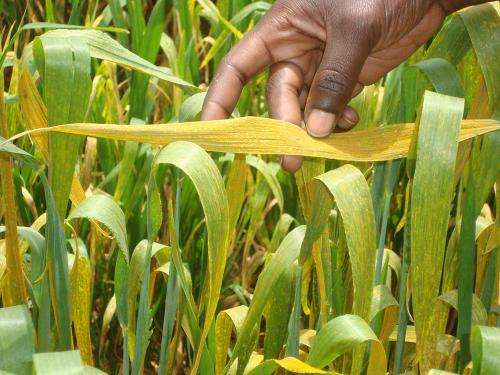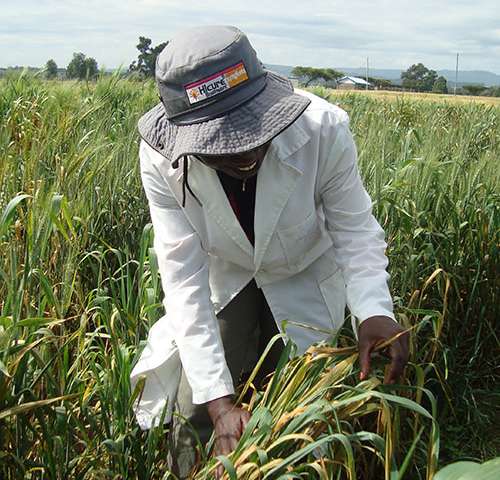PhD students in India, Ethiopia and Kenya to fight wheat stripe rust

Four PhD students appointed in India, Kenya and Ethiopia, will contribute to £1.4 million research to combat wheat stripe rust. A year of their projects will take place in Norwich or Cambridge, as part of a major international effort to improve crop production in developing countries.
Stripe rust poses a serious threat to wheat production. In recent years epidemics of new strains of this fungal disease have resulted in up to 40% yield losses in large wheat-producing areas across the world. These epidemics increase the price of food, threatening rural livelihoods and food security.
"In Kenya 80% of farmers growing wheat are smallholders who struggle to afford fungicide," said PhD student Mercy Wamalwa of Eggerton University, Kenya.
"Wheat is an important income generator for the resource-poor farmers of Ethiopia who sell their surplus produce on the domestic market," added Sisay Kidane, PhD student at the Addis Ababa University, Ethiopia, and a researcher at the Ethiopian Institute of Agricultural research.
The most economic and environmentally sustainable way to fight this devastating disease is to develop genetically resistant wheat varieties. Most modern wheat possesses poor resistance to stripe rust. The project will make use of the genetic diversity in a collection of nearly 650 wheat varieties amassed from around the world in the 1920s, before intensive wheat breeding began.

These so-called 'landraces' produce low yields by modern standards but they represent a potential treasure trove of resistance to stripe rust. The wheat plants will be grown in locations in the home countries of the PhD students and in the UK and assessed for their resilience to stripe rust. The resistance from the best landraces will be bred into modern varieties to produce new high-yielding rust-resistant wheat.
Wild relatives of wheat are another source of valuable diversity. As part of the project, two wild species of goatgrass with strong resistance to stripe rust are under investigation for the source of that resistance.
"If we can identify one of the disease resistance genes from goatgrass we will know what to look for when mining the genomes of other grasses for resistance," commented Mitaly Bansal from Punjab Agricultural University, India.
"It will also provide us with diagnostic markers to track resistance genes in breeding programmes to maximize the potential for durable disease resistance in the field," added Deepika Narang, also from Punjab Agricultural University.
The new project is part of the Sustainable Crop Production Research for International Development, funded by the Department for International Development, the Biotechnology and Biological Sciences Research Council with support from the Bill & Melinda Gates Foundation, and India's Department of Biotechnology.
As part of their studies the PhD students will spend one year abroad in one of the UK partner institutions, which include the John Innes Centre and The Sainsbury Laboratory in Norwich, and the National Institute of Botany in Cambridge. All project partners met each other at the Borlaug Global Rust Initiative workshop held this year in New Delhi. This annual meeting brings together wheat breeders, agronomists and farmers from around the world who continue the work of the late Norman Borlaug to preserve the world's wheat harvests from the devastating effect of rusts.
Provided by John Innes Centre